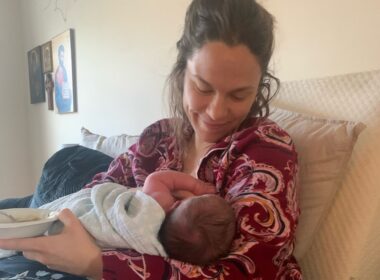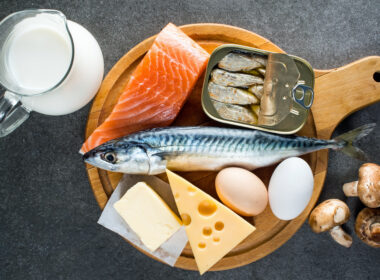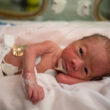Are you hoping to conceive and wondering whether you’ll need to wean a currently breastfeeding child? Because every woman is different and experiences with fertility after birth vary widely from woman to woman, the real question might be “do you need to wean from breastfeeding in order to conceive?” In short, it’s unlikely that a woman would need to stop nursing entirely in order to achieve pregnancy, but there are a number of variables that play into the return of ovulation–which, of course, must occur before one can get pregnant again.
When is breastfeeding considered a way to prevent pregnancy?
When people say that breastfeeding prevents pregnancy, this is most true when the qualifications for the Lactational Amenorrhea Method (LAM) or Ecological Breastfeeding (EBF) are being met. LAM is considered to be an effective method of preventing pregnancy when 1) your baby is less than six months old, 2) your baby is exclusively breastfed (no supplemental formula feedings), and 3) your period has not yet returned. If all three of these qualifications are being met, you are generally considered to still be infertile. EBF requires meeting more rigid criteria to delay ovulation and therefore extend infertility beyond the first six months postpartum (detailed here), and is not considered an evidence-based method of fertility awareness due to lack of modern research into its pregnancy prevention effectiveness.
Breastfeeding prevents pregnancy when it inhibits ovulation
The reason why breastfeeding, especially initially, can inhibit ovulation seems to be due to both hormones and the amount of energy that breastfeeding requires. The biological mechanism for ovulation starts with the pituitary gland giving the “go-ahead” to the ovaries for a follicle to mature and prepare for ovulation. While nursing, especially while nursing around the clock with a newborn, the regular release of the hormone prolactin inhibits this communication from the pituitary gland to the ovary (more information on hormones and charting during breastfeeding here).
However, increasing the amount of time between nursing sessions gives time for mom’s prolactin levels to drop, providing the pituitary gland an opportunity to send its message to the ovaries and begin the ovulation process. Increases in the time between nursing sessions tend to happen naturally, especially after six months, when your baby is (hopefully!) sleeping longer stretches at night and likely beginning to eat solid foods during the day. But again, every woman (and baby!) is different, and while beginning solid foods and having a great night-sleeper can help spur the return of cycles, some women may see many more months go by before their periods return.
The metabolic load hypothesis
Breastfeeding may also inhibit ovulation by requiring substantial amounts of energy and biological resources, referred to as the metabolic load hypothesis [1]. This hypothesis suggests a direct link between insulin production and the return of menstruation–more specifically, that an increase in insulin production may play some role in stimulating ovarian activity. Insulin is the hormone that prompts cells to absorb glucose from the blood to either use or store for later use. An increase in insulin production would indicate that there is more energy (in the form of glucose) available for cells to store, with less nutritional intake going towards the production of breast milk (as usually happens when babies begin consuming other foods). In short, while you are nursing, your body may not have the energy needed to do other things, like ovulate, especially if you have inadequate nutritional intake postpartum.
By way of an example, when I was nursing my first baby, I somehow developed a substantial oversupply. I had enough milk for my baby, for our local milk bank, and plenty leftover to just have wet clothes pretty much all the time… and I felt terrible. I couldn’t figure out why I felt so sick until a friend, who is now an MD, suggested that I double my current food intake until I started to feel better and then scale back until I found the right caloric balance where I still felt like I had good energy. I felt significantly better the first day of eating more, and my fertility returned as soon as my son started sleeping well at night, around seven months.
So, if you are hoping to be nourishing two tiny humans via your body instead of just one, it could potentially help to increase your food consumption ahead of time to ensure you have plenty of molecular energy available for both breastfeeding and biological preparations for pregnancy.
Trying to conceive while breastfeeding
We’ve already covered a couple of factors that may be important in prompting cycles to return, namely by starting to reduce the frequency and duration of nursing sessions (especially once your baby is sleeping well at night and starting to eat solid foods) and by ensuring that you are meeting your caloric needs as a breastfeeding mother. However, a key factor for trying to conceive whether breastfeeding is having optimal timing. Tracking your fertility with a fertility awareness method (FAM) is a bit more complicated while breastfeeding, but certainly doable! Especially if your cycles have not yet returned and you are hoping to identify your first cycle, focusing on the biomarkers that precede ovulation, especially cervical mucus, will be the best indicator of returning fertility. As always, it’s important to find a method that works best for you in your unique circumstances and to talk to an expert if you still have questions.
Breastfeeding after you conceive
Breastfeeding while pregnant shouldn’t pose any problems for your developing fetus, according to research from 2012, but certainly ask your doctor if you have any special circumstances like carrying multiples, or if you have a history of pregnancy complications [2]. And while breastfeeding is unlikely to affect your pregnancy, pregnancy may decrease your milk supply, especially during the second trimester, and change the taste of your milk as the body starts to produce colostrum in preparation for birth.
For some moms, an early drop-off in milk supply is the first indication that they are pregnant again, while other moms breastfeed throughout their pregnancy without any problems. Again, every woman experiencing breastfeeding during pregnancy will have unique genetic, biochemical, and environmental factors that all play into how her body will respond, and whether this leads you to choose to continue breastfeeding, scale back, or wean altogether while trying to conceive or while pregnant again is okay– there’s no single right way to care for your older baby and in-utero baby!
References:
[1] Valeggia, Claudia, and Peter T Ellison. “Interactions between metabolic and reproductive functions in the resumption of postpartum fecundity.” American journal of human biology : the official journal of the Human Biology Council vol. 21,4 (2009): 559-66. doi:10.1002/ajhb.20907 [2] Madarshahian, Farah, and Mohsen Hassanabadi. “A comparative study of breastfeeding during pregnancy: impact on maternal and newborn outcomes.” The journal of nursing research : JNR vol. 20,1 (2012): 74-80. doi:10.1097/JNR.0b013e31824777c1Additional Reading:
Can you really use breastfeeding as natural birth control?
Does breastfeeding prevent you from getting pregnant?
Is birth control safe while breastfeeding?
Yes, you can chart with a fertility awareness method while breastfeeding!
4 reasons you might need to change your fertility awareness method- and how to make the switch








I have been breastfeeding for over 8 years.
Been pregnant 3 times
(3 pairs of female twins)
Sofia and Jojo
7 years 10 months
Anna and Elsa
4 years 4 months
Maddy and Olife
1 year 1 month
My husband and I had agreed that we would let everything take its course.
We rely on breastfeeding as a natural birth control method.
It has been very fruitful and effective for our family.
2nd and 3rd pregnancy of last grade
I’m pregnant and still haven’t had my postpartum period come back.
Today, our current twins are breastfed all the time, but I haven’t gotten my period back after giving birth.
And hopefully it will be a way to increase our baby birth gap for some time to come.